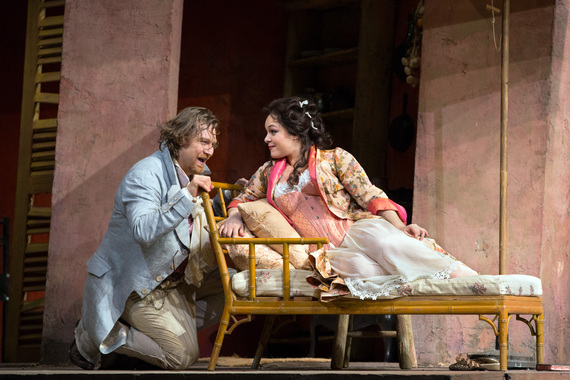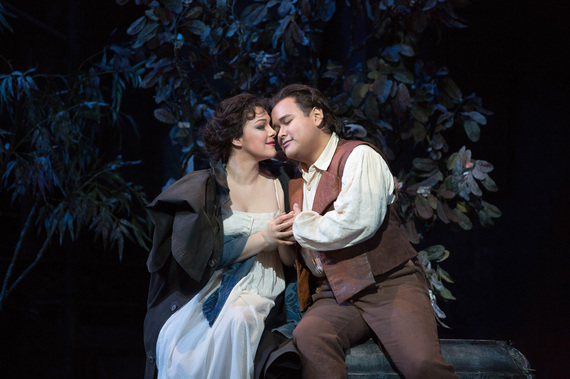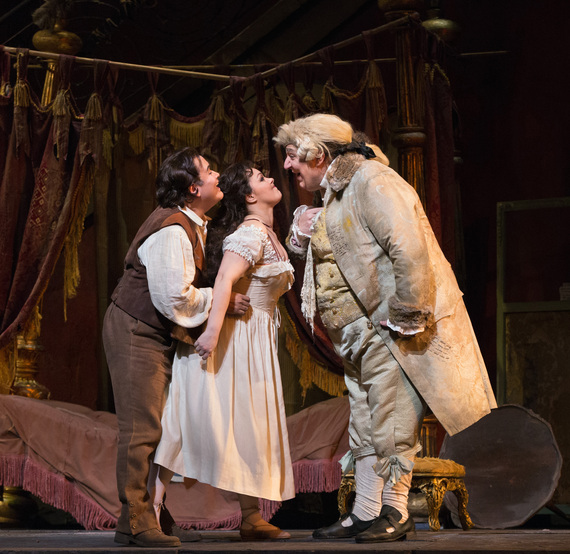There's a lot of Gateano Donizetti being seen at the Metropolitan Opera this season. There's the Tudor Queen cycle (Anna Bolena, Maria Stuarda, and Roberto Devereux, all starring Sondra Radvanovsky), the sappy L'Elisir D'Amore, and, most likely to be overlooked because of its mere 5 performances, Don Pasquale, which opened at the Met on Friday.
Donizetti's delightful 1843 opera buffa, originally written to showcase Luigi Lablache, Antonio Tamburini, Giovanni Mario, and Giulia Grisi, considered the finest singers of their day, is an endearing, old-fashioned "morality" tale in which an aging bachelor, Don Pasquale, is taught a harsh lesson about marriage when he decides to take a much younger wife that is, consequently, his nephew's true love. After an evening of scheming and trickery, the whole affair ends in a cheerful quartet.
Only seeing its third outing in ten years, Otto Schenk's production is, like Don Pasquale himself, frustratingly mindless. Though Rolf Langenfass' sets and costumes are impressive and really do bring sun-drenched Rome to the stage of the Met, Schenk's park-n-bark (or, alternatively, park-n-throw-plants) production provides no insights about an opera that delivers a complex message and is more layered than the screwball comedy it is wont to be taken for.
Ambrogio Maestri, a baritone singing the titular bass part, was forced to rely on his talents as a comic actor when the low-lying tessitura of the title role shrunk his sound. While Maestri's big, comic presence would seem a perfect fit for the part and his concise, sonorous voice is ideal for most of the parts he sings, his Don Pasquale was uncharacteristically lacking in vocal charisma and he struggled to strike a balance with conductor Maurizio Benini, whose efficient tempi and dramatic reading of the score made Donizetti's ebullient opera sound near-Wagnerian at points.
As Dottore Malatesta, Pasquale's physician that sets the whole ruse in motion, Levente Molnár boasts a resonant baritone with a pleasing snarl, but seemed, similarly to Maestri, somewhat out of his element with the part.
Of all the artists I've seen at the Met, tenor Javier Camarena, as Pasquale's nephew Ernesto, has always gotten the most applause. Whether it's his endearing stage presence, clean, honeyed high-tenor, stellar high notes that ring throughout the house but are produced with just enough effort so that you know that he is really involved in what he is singing, or a combination of the three, Camarena is a superb singer and an indispensable asset to the production. Most impressive was his sensitively-phrased "Com'è gentil," sung from offstage. And while the Met has cultivated him well over the years (He has sung Almaviva in Barbiere, Ramiro in Cenerentola, Elvino in La Sonnambula at the house, and will sing Arturo in I Puritani next season), Camarena is ready and deserving of even more high-profile assignments. If a new Semiramide production is rumored to be coming down the pike at the Met, then maybe Camarena as Idreno? One can hope...
The most unexpectedly excellent performance came from Met debutante Eleonora Buratto as Norina, the young widow with whom Ernesto is in love. While the opera may be named for Don Pasquale, it is Norina that carries the show, and carry the show she did. With supreme, exacting control, Buratto wields an ample voice that is dark in the lower register, beautiful and plush in the middle, and with shimmering metallic high notes at the top that filled the house with ease. She was up to all of the production's physical comedy (including an impressively-executed somersault onto a deck chair) and, obviously deeply invested in the material and her performance, threw herself into the part. Her "Quel Guardo il Cavaliere... So Anch'io la Virtù Magica" really told a story and her voice blended exquisitely with Camarena in their final "Tornami a dir" duet. The world may have finally found its next Italian soprano.
The Met Orchestra and Chorus did their usually-impressive job with special props going to trumpet player whose solo at the beginning of Act III would have brought a tear to Ennio Morricone's eye.
There are still four more chances to catch Don Pasquale this season at the Met, and you'd be well-advised to see Camarena and Buratto in action. Tickets are available here.
All photos by Marty Sohl/Metropolitan Opera


